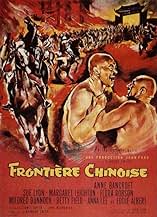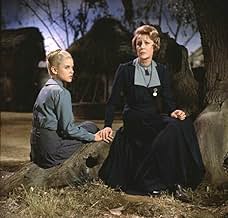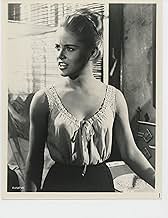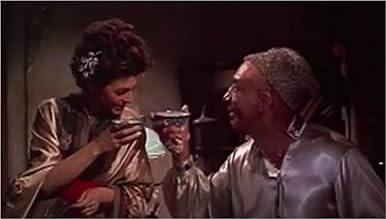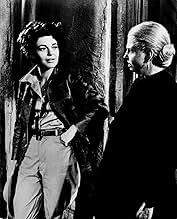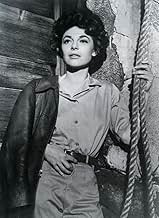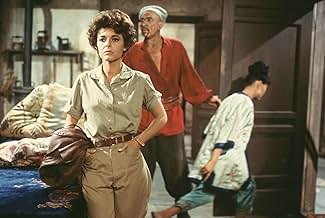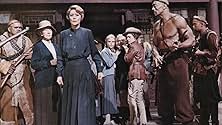IMDb-BEWERTUNG
6,7/10
2859
IHRE BEWERTUNG
Füge eine Handlung in deiner Sprache hinzuIn 1935 China, seven dedicated missionary women try to protect themselves from the advances of a barbaric Mongolian warlord and his cut-throat gang of warriors.In 1935 China, seven dedicated missionary women try to protect themselves from the advances of a barbaric Mongolian warlord and his cut-throat gang of warriors.In 1935 China, seven dedicated missionary women try to protect themselves from the advances of a barbaric Mongolian warlord and his cut-throat gang of warriors.
- Regie
- Drehbuch
- Hauptbesetzung
- Auszeichnungen
- 1 Nominierung insgesamt
Lee Kolima
- Warrior
- (Nicht genannt)
Empfohlene Bewertungen
For a film nut like me. 7 Women offers a plethora of pleasures. Patricia Neal was suppose to star but ill health made her unavailable. Anne Bancroft took over as the drinking, smoking, swearing saint. and all the aspects of this complex character are totally real in Anne Bancroft's face. She arrives to the Mission in China like a benevolent tornado. The spectacular Margaret Leighton is the head of the Mission and she plays it like a raw nerve, Among the other women, Flora Robson, Queen Elizabeth to Laurence Olivier's Michael Ingolby in Fire Over England, brings a voice of reason that reassure us, Betty Field , Kim Novak's mother in Picnic, among a gallery of memorable characters, plays the pregnant middle age woman who offends the Christian mission for having had sex with her husband under their roof. Mildred Dunnock, Anna Lee and even Stanley Kubrick's Lolita, Sue Lyon is part of the Mission. On the other side, the villains, that offended so many people, John Ford casts his longtime companion Woody Strode. I understand and even accept all the criticisms listed in the reviews of this pages but, somehow, I can put all that aside and enjoy the plethora of pleasures that it offers.
John Ford's swan song is very underrated. Anne Bancroft plays a chain-smoking doctor who has fled the United States (for reasons unknown, unless they were explained during the minute or so I was away to answer the phone) to work at a mission in China. Margaret Leighton plays the head of this mission, a devout Christian who controls her underlings with strict rules. Various troubles ensue, the most prominent being the threat of a cholera epidemic, a raid by Mongolian bandits, and a pregnant woman who is nearing menopause, which makes the birth a very difficult situation. It is the second problem which I mention that takes up most of the plot. The mission has heard stories of these Mongolians in the nearby areas. Leighton is sure that they will never dare attack her mission, by the grace of God and America. But they do, and they keep all the white women hostage after killing off every Chinese person in sight. They believe that they can win a ransom for them. The tough Bancroft bravely opposes them, but she can make no headway by those means. Instead, the leader of the bandits demands sex. In this way, she is able to influence the way the women are treated (especially concerning the birth). The main conflict of the film is between Leighton and Bancroft. It's very 60s, with the progressive, liberated woman fighting against the strict, sexless one. The role of religion is very interesting in the film. It's shocking that Ford, a devout Catholic, would make the headmistress so foolish. It's a very intelligent criticism of the holier-than-thou attitude of some. When death looks imminent, Leighton seems almost excited to become a martyr; and she's willing and ready to take everyone else with her. When Bancroft sees her chance to save the others, Leighton viciously attacks her for being the "whore of Babylon." The final scene is quite excellent. What a great way for the greatest director of all time end his career.
John Ford, usually with the reputation of misogynist, directed his last film surrounded by strong female characters and where the male characters are not particularly relevant. The movie is set in China, 1935, where a Civil War is taking place. Anne Bancroft, a female doctor who is also an atheist, says: "I spent years in slum hospitals. I never saw God come down and take care of anyone". Ford, with his catholic roots, allows himself to be pessimistic. Even when Margaret Leighton, a supposed strong believer is confronted by the female doctor, she says: "I've always searched for something that... isn't there. And God is not enough. God help me - He isn't enough".
The title refers to seven women, but the fact is that there are eight: What led us to believe that Anne Bancroft is excluded from the beginning? She wears man's clothes, she smokes and drinks. The loner Bancroft, condemned to always walk alone, like Ethan Edwards in "The Searchers". And what about the final scene, with a rare beauty, where the viewer isn't allowed to watch her fall? She is dressed in woman's clothes for the first time and is prepared to a truly catholic gesture, the sacrifice. "Seven Women" is a beautiful film, almost perfect. Towards the end, we become aware that Mr. Ford will live eternally.
The title refers to seven women, but the fact is that there are eight: What led us to believe that Anne Bancroft is excluded from the beginning? She wears man's clothes, she smokes and drinks. The loner Bancroft, condemned to always walk alone, like Ethan Edwards in "The Searchers". And what about the final scene, with a rare beauty, where the viewer isn't allowed to watch her fall? She is dressed in woman's clothes for the first time and is prepared to a truly catholic gesture, the sacrifice. "Seven Women" is a beautiful film, almost perfect. Towards the end, we become aware that Mr. Ford will live eternally.
...what a moving last picture for Ford's swansong.Too often underrated ,"Seven woman" in spite of a sometimes weak script-too many things happen in too little time- is perhaps the most modern film in Ford 's canon.
We find one of Ford's permanent features:a group of human beings in jeopardy who's got to struggle against an enemy:"Stagecoach" is the best example .Dudley Nichols's screenplay was inspired by Guy de Maupasssant's "Boule de Suif".
Women always played a prominent part in Ford's canon.Ford's world is deceptive :it seems to be a male world but actually women are the strongest and the wisest (Jane Darwell's character in "Wagon Master" ,the soldiers' wives in "Fort Appache" ).It was only natural that Ford's last movie was an all-women film (all men,including Albert's character are caricatures.) And these women are very endearing.Anne Bancroft,one of the greatest actresses America ever had, shines all along the movie ,and even when the script verges on grotesque ,she's still beaming, fascinating ,never losing her sense of humor.Even when she "becomes Chinese" ,nobody would think of laughing at her.She's so strong an actress that we seem to know her heroine intimately,her life in NYC people dispensaries,her sad love stories.With her masculine swagger,her boots ,her cigarettes and her whiskey we see a broken woman who has lost all her illusions.She's an atheist,which is very rare in Ford's canon.
Religion is in the center of many a Ford movie ."Seven Women" takes place in a mission .All these women put their faith in God and ...in America (We're American citizens!).One of them (Margaret Leighton) is particularly interesting : a tight-lipped puritan at the beginning of the movie,she becomes,slowly but inexorably ,a mystic lunatic,mentioning Babylon and sinners.Like "Stagecoach" ,"seven femmes " borrows from Maupassant.Like his heroine,"Boule De suif" Cartwright gives her life in sacrifice so the others can survive.
Six Woman are leaving Sodom under an ominous sky :one of them is screaming about lust while the blonde schoolteacher (Sue Lyon,whose role is an equivalent of Caroll Baker's in "Cheyenne Autumn ,though it's an underwritten part ),along with the newborn child, represents hope for the future:all that she went through ,her late heroine (she was the only one to be nice with Cartwright when she arrived)might help her to carry on.But Ford's last opus,like Huston's "the dead" is a very pessimistic opus.
We find one of Ford's permanent features:a group of human beings in jeopardy who's got to struggle against an enemy:"Stagecoach" is the best example .Dudley Nichols's screenplay was inspired by Guy de Maupasssant's "Boule de Suif".
Women always played a prominent part in Ford's canon.Ford's world is deceptive :it seems to be a male world but actually women are the strongest and the wisest (Jane Darwell's character in "Wagon Master" ,the soldiers' wives in "Fort Appache" ).It was only natural that Ford's last movie was an all-women film (all men,including Albert's character are caricatures.) And these women are very endearing.Anne Bancroft,one of the greatest actresses America ever had, shines all along the movie ,and even when the script verges on grotesque ,she's still beaming, fascinating ,never losing her sense of humor.Even when she "becomes Chinese" ,nobody would think of laughing at her.She's so strong an actress that we seem to know her heroine intimately,her life in NYC people dispensaries,her sad love stories.With her masculine swagger,her boots ,her cigarettes and her whiskey we see a broken woman who has lost all her illusions.She's an atheist,which is very rare in Ford's canon.
Religion is in the center of many a Ford movie ."Seven Women" takes place in a mission .All these women put their faith in God and ...in America (We're American citizens!).One of them (Margaret Leighton) is particularly interesting : a tight-lipped puritan at the beginning of the movie,she becomes,slowly but inexorably ,a mystic lunatic,mentioning Babylon and sinners.Like "Stagecoach" ,"seven femmes " borrows from Maupassant.Like his heroine,"Boule De suif" Cartwright gives her life in sacrifice so the others can survive.
Six Woman are leaving Sodom under an ominous sky :one of them is screaming about lust while the blonde schoolteacher (Sue Lyon,whose role is an equivalent of Caroll Baker's in "Cheyenne Autumn ,though it's an underwritten part ),along with the newborn child, represents hope for the future:all that she went through ,her late heroine (she was the only one to be nice with Cartwright when she arrived)might help her to carry on.But Ford's last opus,like Huston's "the dead" is a very pessimistic opus.
7 Women (1966)
*** (out of 4)
John Ford's final film is one you really wouldn't expect to see from him but I guess it goes to show what a great director he was as he could end his nearly fifty-year career with something fresh and original. The film takes place in 1935 China as a free-wheeling and free-spirited doctor (Anne Bancroft) comes to work at a missionary where she immediately clashes with the head of the mission (Margaret Leighton). The head doesn't agree with the doctor's way of life, which includes smoking, drinking, profane language and of course not believing in God. Soon the doctor is battling this but then a plague breaks out in the mission and then they come under attack from some rebels. I'm not sure if stunned is too strong of a word but that's what my feelings were going through this film. I've seen at least fifty John Ford movies and I never thought I'd see something like this one. The attitude of the Bancroft character just seems like something the director would stay away from and the anti-religion stance was so strong that again I couldn't believe this was something from Ford. I think if you showed this movie to the biggest of film buffs and didn't tell them who the director was I doubt they'd ever guess it was someone like Ford. I really appreciated the 60s fling thrown into the picture because you can obviously tell that they were taking a 60s woman and putting her into this situation. There's a bit about the doctor leaving America because a woman couldn't get a fair shake at a good career and again I wonder if they were standing up for women's rights. The film also has bits of lesbianism, the religious hypocrites and a strong sense of sexuality. The movie certainly isn't ahead of its time considering this was 1966 but it's still impressive stuff. Bancroft is downright marvelous here and turns in a very memorable performance. I must admit that I fell in love with her character as you have to respect the toughness that the actress brings to the role. I believed every second of it and there's just a certain fire to Bancroft that clearly shows up on the screen. Leighton is one of those love-to-hate performances and makes for a great villain. Sue Lyon, best known from Kubrick's LOLITA, turns in a fine performance. We even get Woody Strode in a small role as one of the warriors. The film's pacing is a very slow one and it feels like the movie is a lot longer than its 86-minute running time but this isn't a negative thing as I never got bored. I was certainly surprised to see how much Ford managed to cram into the short running time. His direction here contains some of his softest touches but they all work. It's a shame this movie isn't mentioned more when people discuss his career but it's certainly a good and original way for him to go out.
*** (out of 4)
John Ford's final film is one you really wouldn't expect to see from him but I guess it goes to show what a great director he was as he could end his nearly fifty-year career with something fresh and original. The film takes place in 1935 China as a free-wheeling and free-spirited doctor (Anne Bancroft) comes to work at a missionary where she immediately clashes with the head of the mission (Margaret Leighton). The head doesn't agree with the doctor's way of life, which includes smoking, drinking, profane language and of course not believing in God. Soon the doctor is battling this but then a plague breaks out in the mission and then they come under attack from some rebels. I'm not sure if stunned is too strong of a word but that's what my feelings were going through this film. I've seen at least fifty John Ford movies and I never thought I'd see something like this one. The attitude of the Bancroft character just seems like something the director would stay away from and the anti-religion stance was so strong that again I couldn't believe this was something from Ford. I think if you showed this movie to the biggest of film buffs and didn't tell them who the director was I doubt they'd ever guess it was someone like Ford. I really appreciated the 60s fling thrown into the picture because you can obviously tell that they were taking a 60s woman and putting her into this situation. There's a bit about the doctor leaving America because a woman couldn't get a fair shake at a good career and again I wonder if they were standing up for women's rights. The film also has bits of lesbianism, the religious hypocrites and a strong sense of sexuality. The movie certainly isn't ahead of its time considering this was 1966 but it's still impressive stuff. Bancroft is downright marvelous here and turns in a very memorable performance. I must admit that I fell in love with her character as you have to respect the toughness that the actress brings to the role. I believed every second of it and there's just a certain fire to Bancroft that clearly shows up on the screen. Leighton is one of those love-to-hate performances and makes for a great villain. Sue Lyon, best known from Kubrick's LOLITA, turns in a fine performance. We even get Woody Strode in a small role as one of the warriors. The film's pacing is a very slow one and it feels like the movie is a lot longer than its 86-minute running time but this isn't a negative thing as I never got bored. I was certainly surprised to see how much Ford managed to cram into the short running time. His direction here contains some of his softest touches but they all work. It's a shame this movie isn't mentioned more when people discuss his career but it's certainly a good and original way for him to go out.
Wusstest du schon
- WissenswertesAnne Bancroft recalled producer and director John Ford's tearing pages out of the script and described him as "Marvelous but loony."
- PatzerThe hairstyle of Dr. Cartwright is a 1960s fashion that is out of place in 1935.
- Zitate
Dr. D.R. Cartwright: [to Tunga Khan, Bandit Leader] So long, ya bastard!
- Crazy CreditsPROLOGUE: "1935: North China near the border of Mongolia...A land of feudal war lords and marauding bandit armies...A time of lawlessness and violence."
- VerbindungenReferenced in MGM 40th Anniversary (1964)
- SoundtracksJesus Loves Me
(uncredited)
Words by Anna B. Warner and David Rutherford McGuire
Music by William B. Bradbury
Sung by Sue Lyon and the children
Top-Auswahl
Melde dich zum Bewerten an und greife auf die Watchlist für personalisierte Empfehlungen zu.
- How long is 7 Women?Powered by Alexa
Details
- Erscheinungsdatum
- Herkunftsland
- Sprachen
- Auch bekannt als
- 7 Women
- Drehorte
- Produktionsfirmen
- Weitere beteiligte Unternehmen bei IMDbPro anzeigen
Box Office
- Budget
- 2.300.000 $ (geschätzt)
- Weltweiter Bruttoertrag
- 228 $
- Laufzeit1 Stunde 27 Minuten
- Farbe
- Seitenverhältnis
- 2.35 : 1
Zu dieser Seite beitragen
Bearbeitung vorschlagen oder fehlenden Inhalt hinzufügen



